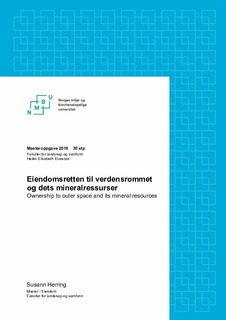| dc.contributor.advisor | Elvestad, Helén Elisabeth | |
| dc.contributor.advisor | Nordtømme, Per Christian | |
| dc.contributor.author | Herring, Susann | |
| dc.date.accessioned | 2018-09-06T11:57:34Z | |
| dc.date.available | 2018-09-06T11:57:34Z | |
| dc.date.issued | 2018 | |
| dc.identifier.uri | http://hdl.handle.net/11250/2561228 | |
| dc.description.abstract | Tema for denne masteravhandlingen er ekstraterrestial eiendomsrett, og hensikten er å samle informasjon, vurdere og komme frem til en fortolkning av utvalgte relevante regler innen verdensrommets rett for å besvare følgende problemstilling: Hvem eier verdensrommet inklusive dets himmellegemer i sin alminnelighet, og er det tillatt å drive mineralutvinning på himmellegemene i særdeleshet?
Bakgrunnen for valgte problemstilling er temaets fremtidsrettede og kontroversielle art, hvor det er mange motstridene oppfatninger om hvordan rammeverket skal forstås. Dette kan skyldes blant annet at den grunnleggende traktaten for verdensrommets rett består av generelle bestemmelser som ikke adresserer denne problemstillingen direkte. Svaret må derfor utledes av traktatens ånd og formål. Dette på et felt som er i stadig utvikling, med stadig flere aktører som kommer på banen, hvilket vil aktualisere behovet for å klargjøre innholdet i bestemmelsene.
For å avlede en fortolkning ut i fra ordlyden i traktatverket, vil den positivistiske-deduktive juridiske metoden bli benyttet. På denne måten kan jeg belyse ekstraterrestiale eiendomsrettslige spørsmål ved å tolke traktatverket og forsøksvis utfylle et avgrenset og til nå, uavklart område i akademia på dette feltet.
Funnene viser at hverken stater eller enkeltpersoner kan eie verdensrommet eller dets himmellegemer, da det blant annet bryter grunnleggende prinsipper og formål nedfelt i det gjeldende traktatverket. Verdensrommet og dets himmellegemer er «the common province of mankind» - menneskehetens felles område.
Det er etter min oppfatning neppe hjemmelsgrunnlag for ressursutnyttelse under the Outer Space Treaty, men det foreligger noen internasjonal konsensus om dette spørsmålet pr. i dag. Etter Måneavtalen derimot, foreligger det hjemmelsgrunnlag for ressursutnyttelse jf. «exploitation» i art. 11, men bestemmelsen er ikke anerkjent som sedvanerettslig folkerett, og gjelder kun for de 18 statene som har ratifisert denne avtalen. Dessuten påhviler det et moratorium for slik virksomhet under Måneavtalen inntil partene har fremforhandlet og inngått en tilleggsavtale som omtales som regimeavtalen. | nb_NO |
| dc.description.abstract | The theme of this master’s thesis is extraterrestrial property rights, and the purpose is to gather information, assessing it and reaching an interpretation of selected relevant rules of space law in order to answer the following question: Who owns the outer space, including its celestial bodies, in general, and is it allowed to conduct mining on celestial bodies, in particular?
The background for the chosen question is the provident and controversial nature of extraterrestrial property rights, where there are many conflicting interpretations of the framework. This may be due to, inter alia, the fact that the fundamental treaty for space law consists of general provisions, which has resulted in ambiguities in the framework. Ultimately, this is a constantly evolving field, with more and more players coming onto the scene, necessitating the need for clarification in the content of the provisions.
To derive at an interpretation based on the positive wording of the law, the positivistic deductive legal method will be employed. By doing so, I can elucidate extraterrestrial property rights issues by interpreting the treaty and attempting to complement a limited and so far, ambiguous area of academia in this field by presenting an interpretation of the framework.
The findings show that neither states nor individuals can appropriate the outer space or celestial bodies, as it violates, among other things, the fundamental principles and purposes embodied in the current framework. The outer space and its celestial bodies are the common province of mankind.
There is hardly any legal basis for resource utilization in the Outer Space Treaty, but there doesn’t appear to be any international consensus on the subject-matter today. However, pursuant to the Moon Agreement, there is a legal basis for resource utilization, hence, the wording "exploitation" in Art. 11, but the provision is not recognized as customary international law and applies only to the 18 states that have ratified this agreement. Furthermore, there rests a moratorium on such activities until the regime agreement is negotiated and entered into force. | nb_NO |
| dc.language.iso | nob | nb_NO |
| dc.publisher | Norwegian University of Life Sciences, Ås | nb_NO |
| dc.rights | Attribution-NonCommercial-NoDerivatives 4.0 Internasjonal | * |
| dc.rights.uri | http://creativecommons.org/licenses/by-nc-nd/4.0/deed.no | * |
| dc.subject | Eiendomsrett | nb_NO |
| dc.subject | Mineralutvinning | nb_NO |
| dc.subject | Ressursutvinning | nb_NO |
| dc.subject | Folkerett | nb_NO |
| dc.subject | Himmellegemer | nb_NO |
| dc.subject | Ownership | nb_NO |
| dc.title | Eiendomsretten til verdensrommet og dets mineralressurser | nb_NO |
| dc.title.alternative | Ownership to outer space and its mineral resources | nb_NO |
| dc.type | Master thesis | nb_NO |
| dc.subject.nsi | VDP::Social science: 200::Law: 340::International law: 344 | nb_NO |
| dc.source.pagenumber | 79 | nb_NO |
| dc.description.localcode | M-EIE | nb_NO |

